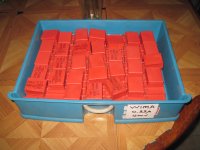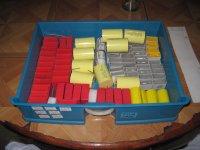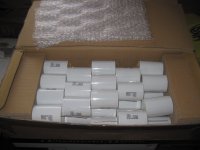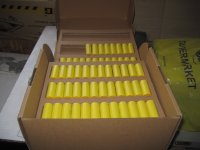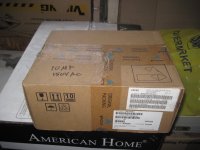The tweeters are Focal Utopia Beryllium from the No.7 Active speaker system (Costs about 1000 USD for a pair excluding shipping from France). It is installed in my car, and the system is using active amplification with digital crossover points from a DSP.
My aim is to avoid the DC, my amplifiers have some kind of turn-off pop. I am going for 22uf to keep the passive crossover point at least two octaves below the digital crossover point. My crossover point is around 4.5-5kHz at 24db slope.
I hope this clears the situation. I am still indecisive on what to get.
Read about Duelund (too big), Obbligato (too warm) and Mundorf (too cheap as per one seller in Netherlands).
Considering all the kind input by fellow members, I think majority is suggesting the MKP in any reputable brand. I am considering buying the Wima MKS4 which is 10$ each. Still not sure though.
I have almost little knowledge about capacitors, today I read 7 pages of this thread, I never thought it would cause a debate. I learnt about MKP, motor start, motor run, film, oil based, ESR etc etc Too much to digest for me, but I am willing to learn.
I am moving into buying quality capacitors from buying NOS tubes haha This is seriously an addiction.
My aim is to avoid the DC, my amplifiers have some kind of turn-off pop. I am going for 22uf to keep the passive crossover point at least two octaves below the digital crossover point. My crossover point is around 4.5-5kHz at 24db slope.
I hope this clears the situation. I am still indecisive on what to get.
Read about Duelund (too big), Obbligato (too warm) and Mundorf (too cheap as per one seller in Netherlands).
Considering all the kind input by fellow members, I think majority is suggesting the MKP in any reputable brand. I am considering buying the Wima MKS4 which is 10$ each. Still not sure though.
I have almost little knowledge about capacitors, today I read 7 pages of this thread, I never thought it would cause a debate. I learnt about MKP, motor start, motor run, film, oil based, ESR etc etc Too much to digest for me, but I am willing to learn.
I am moving into buying quality capacitors from buying NOS tubes haha This is seriously an addiction.
What do you mean by "tweeter protection"? What are you trying to achieve? 22uF seems like a rather large value for a typical tweeter x-over.
I assume the Beryllium tweeters are high quality drivers (ScanSpeaks?), so a good MKP capacitor is in order. I commonly use the Mundorf M-Caps, and I prefer them over Cornell-Dubilier, Vishay/Roederstein, Clarity, etc. with respect to sound quality (as tested using my subjective ears).
I get my M-Caps here:
http://www.lautsprechershop.de/hifi/mundorf_kondensatoren.htm]Strassacker, Komponenten: Lautsprecher, Frequenzweichen, Bauelemente[/url]
Shop
Just pay attention shipping costs, which will depend on where you live.
By moving the capacitor value up, it's effect becomes negligible on the signal that passes through.
You can use any capcitor for this non filtering duty.
It has become a coupling capacitor.
Even an electrolytic will do a pretty good job.
Any metalised plastic film will do a good job.
It would be a waste of money (and time discussing this) on exotic capacitors for coupling duty where they would be two octaves outside the passband.
You can use any capcitor for this non filtering duty.
It has become a coupling capacitor.
Even an electrolytic will do a pretty good job.
Any metalised plastic film will do a good job.
It would be a waste of money (and time discussing this) on exotic capacitors for coupling duty where they would be two octaves outside the passband.
You are right Infinia about mechanical switching which might kill the tweeter before it knows a surge, I just read all your posts.
You guessed it right, it is active design. The 22uF capacitor being used with an 8 Ohms driver gives a first order 6db slope around 800-900Hz frequency.
You guessed it right, it is active design. The 22uF capacitor being used with an 8 Ohms driver gives a first order 6db slope around 800-900Hz frequency.
K thanks for the OP
AFAIK mech switching isn't as fast as a series capacitor , esp on a tweeter, it doesnt take much time for damage. woofers maybe OK to survive depending on other factors like max. excursion . in other words normally speakers already have series tweeter caps in their PASSIVE Xover, the OP maybe relying on direct connection with a big crude 22 uF DC blocking cap. E.g. active design.
if it was me I'd use a much smaller cap and incorporate it as part of the whole transfer function , als lil more finesse.
Have you ever considered that the best option might in fact be the cheapest?
http://www.diyaudio.com/forums/lounge/143675-petp-capacitors-one-best.html
You seem to place spending a lot of money as a primary selection criterion.
http://www.diyaudio.com/forums/lounge/143675-petp-capacitors-one-best.html
You seem to place spending a lot of money as a primary selection criterion.
Last edited:
Someone already suggested these, PETP.
Nah, brother 😀 I don't want to spend endless amount of money on these. This is my first time, I always shoot for the best bet available.
Nah, brother 😀 I don't want to spend endless amount of money on these. This is my first time, I always shoot for the best bet available.
Have you ever considered that the best option might in fact be the cheapest?
http://www.diyaudio.com/forums/lounge/143675-petp-capacitors-one-best.html
You seem to place spending a lot of money as a primary selection criterion.
Last edited:
Thanks Andrew, this gets me very close to my capacitors 🙂 I just read in detail about coupling capacitors and their function in an electrical circuit. Call me rusty, it's been 10 years I graduated as an electrical engineer.
So this would just be fine for my useage? Link
Russian army surplus, looks good and vintage. I'll buy 4 just to be on the safe side.
I am using electrolytic atm, 10 cents a pair, 22uf 25V.
So this would just be fine for my useage? Link
Russian army surplus, looks good and vintage. I'll buy 4 just to be on the safe side.
I am using electrolytic atm, 10 cents a pair, 22uf 25V.
By moving the capacitor value up, it's effect becomes negligible on the signal that passes through.
You can use any capcitor for this non filtering duty.
It has become a coupling capacitor.
Even an electrolytic will do a pretty good job.
Any metalised plastic film will do a good job.
It would be a waste of money (and time discussing this) on exotic capacitors for coupling duty where they would be two octaves outside the passband.
Considering all the kind input by fellow members, I think majority is suggesting the MKP in any reputable brand. I am considering buying the Wima MKS4 which is 10$ each. Still not sure though.
Wima MKS4 is Metallized Polyester, not as good as MKP foil.
Good and affordable 22uf MKP is found in the Mundorf Evo Oil
The tweeters are Focal Utopia Beryllium from the No.7 Active speaker system (Costs about 1000 USD for a pair excluding shipping from France). It is installed in my car, and the system is using active amplification with digital crossover points from a DSP.
My aim is to avoid the DC, my amplifiers have some kind of turn-off pop.
Yes, a capacitor will block DC. But as far as I can tell, this is a high-quality system, and inserting a capacitor will affect the sound quality (maybe not much, but it will be there). A good capacitor will cost a lot.
But why don't you fix the turn-off pop and avoid the problem from the start? A high-quality system should not produce pops and stuff. If it's not straight forward to remove the pop at its source, you might insert a relay that's powered from the main switch, so it disconnects the tweeter before the amp will poop its pops. MUCH cheaper and better than a capacitor.
It is installed in my car,
Pardon me for asking, but which car is expected to drive around in Saudi Arabia with $1k Beryllium tweeters ?
Pardon me for asking, but which car is expected to drive around in Saudi Arabia with $1k Beryllium tweeters ?
Good question brother 🙂 This brings up the topic of heat, I just read a warning about using oil caps (Mundorf, Jensen, and others) in high heat situations. Saudi Arabia is mostly 40C plus in summers and now it is around 28C.
I have been driving around for like 2 years already, I think I am the only one out there doing audio.
Yes it is, the amplifiers I bought over 5 years ago are not giving pops. I read a lot about it but in the end I found that there is some trapped AC in the speaker coils that causes a turn off pop and there is almost nothing that we can do to fix it.
I thought of putting a relay circuit but in any case I need a protection mechanism, I have seen people losing their tweeters when their DSP units take a DC dump on them. You cannot switch off a processor like that, it might lose the onboard configurations.
All I need is a capacitor, as Andrew mentioned, it does not alter any sound since it is only a coupling capacitor, and I think I agree with him. Only blocks DC, and since I have designed it to be two octaves lower than my digital crossover point, then there will be absolutely no effect on the sound. I am betting on it.
I thought of putting a relay circuit but in any case I need a protection mechanism, I have seen people losing their tweeters when their DSP units take a DC dump on them. You cannot switch off a processor like that, it might lose the onboard configurations.
All I need is a capacitor, as Andrew mentioned, it does not alter any sound since it is only a coupling capacitor, and I think I agree with him. Only blocks DC, and since I have designed it to be two octaves lower than my digital crossover point, then there will be absolutely no effect on the sound. I am betting on it.
Yes, a capacitor will block DC. But as far as I can tell, this is a high-quality system, and inserting a capacitor will affect the sound quality (maybe not much, but it will be there). A good capacitor will cost a lot.
But why don't you fix the turn-off pop and avoid the problem from the start? A high-quality system should not produce pops and stuff. If it's not straight forward to remove the pop at its source, you might insert a relay that's powered from the main switch, so it disconnects the tweeter before the amp will poop its pops. MUCH cheaper and better than a capacitor.
I found that there is some trapped AC in the speaker coils that causes a turn off pop and there is almost nothing that we can do to fix it.
.
a really funny tale😛
Be sure any pops are definitely caused by the driving amp!
a really funny tale😛
Be sure any pops are definitely caused by the driving amp!
I don't really believe in it either, otherwise all speakers should pop 😀
I know it's my amps, but they are old now :/
This can also be due to improper grounding, I have 4 onboard amplifiers, and one DSP. Car audio is too complex. LOL!
I would like you to compare the system sound with the cheap electro as the treble coupling capacitor to the modified version with the treble coupling capacitor changed to a plastic film type.Yes it is, the amplifiers I bought over 5 years ago are not giving pops. I read a lot about it but in the end I found that there is some trapped AC in the speaker coils that causes a turn off pop and there is almost nothing that we can do to fix it.
I thought of putting a relay circuit but in any case I need a protection mechanism, I have seen people losing their tweeters when their DSP units take a DC dump on them. You cannot switch off a processor like that, it might lose the onboard configurations.
All I need is a capacitor, as Andrew mentioned, it does not alter any sound since it is only a coupling capacitor, and I think I agree with him. Only blocks DC, and since I have designed it to be two octaves lower than my digital crossover point, then there will be absolutely no effect on the sound. I am betting on it.
Please report what your reliable listening friends say. Mono with alternate channels playing standard and modified.
You are right Infinia about mechanical switching which might kill the tweeter before it knows a surge, I just read all your posts.
You guessed it right, it is active design. The 22uF capacitor being used with an 8 Ohms driver gives a first order 6db slope around 800-900Hz frequency.
Hi LR
I read about your "pops" in your mobile audio system.
this is very typical in active setups, the best solution is to power sequence or mute the inputs to the final amp/s (PA) E.g. last to turn on and 1st to turn off, this can be solved by many custom solutions. Upon turn on the active filters take longer to "settle down or stabilize" than good quality power amps (PA). Also the PAs often take a long time to turn off, due to hold times of the various power supplies, so you hear the non audio nasties. IMO whomever you got the pre amp /DSP from should be aware of this problem and provide controller outputs for the PAs enable /mutes.
Last edited:
Input mutes that are slow for on and fast for off are needed.
Similarly output isolation/protection that are slow for on and fast for off are useful as well.
Similarly output isolation/protection that are slow for on and fast for off are useful as well.
- Status
- Not open for further replies.
- Home
- Member Areas
- The Lounge
- What are the great 'audio capacitors' and where do I get a good price on them?
